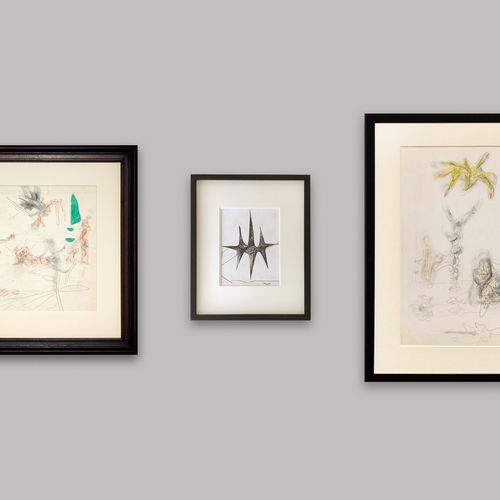Roberto Antonio Sebastián Matta Echaurren was born in Santiago, Chile, on 11 November 1911. After studying architecture at the Pontificia Universidad Católica de Chile, in Santiago, Matta moved to Europe in 1933. In Paris he took a position as a draftsman in the architectural studio of Le Corbusier in Paris, which he held until 1937. During this time, while travelling in Spain and Portugal, the artist was introduced to the poets Federico García Lorca and Pablo Neruda. Through them, Matta became familiar with Surrealism and after meeting Salvador Dalí and André Breton, he joined the movement that same year. In 1938, Matta experimented with automatic writing alongside Yves Tanguy and Gordon Onslow Ford, subsequently making his first paintings, called ‘inscapes’ or ‘psychological morphologies’, characterised by bright colours and the fusion of architectural space with biomorphic forms.
In 1939, with Marcel Duchamp's encouragement, Matta moved to the United States. In New York, he started to form relationships with the new generation of painters which included artists such as Arshile Gorky, Robert Motherwell, and Jackson Pollock – with whom Matta experimented using techniques inspired by automatic writing. Matta remained in New York for almost a decade, and there established himself as one of the most influential artists of his time – which is confirmed by the exhibitions held throughout the 1940s at Julien Levy Gallery, Pierre Matisse Gallery, and Peggy Guggenheim’s Art of This Century, as well as later in his 1957 exhibition at the Museum of Modern Art, New York, curated by William Rubin. In 1948, Matta returned to Paris to find that he had been expelled from the Surrealist group. Over the following decades he became less interested in representing the inner self and more concerned with expressing universal social experiences. He lived and worked between South America and Europe (Paris, Rome, Milan, Tarquinia London) until he died on 23 November 2002 in Civitavecchia, Italy.
Matta’s work can be found in the following selected international collections: the Museum of Modern Art (MoMA), New York; the Metropolitan Museum of Art, New York; Solomon R. Guggenheim Museum, New York; Art Institute of Chicago; Philadelphia Museum of Modern Art; the Menil Collection, Houston; Los Angeles County Museum of Art (LACMA); the Peggy Guggenheim Collection, Venice; Museo Nacional Centro de Arte Reina Sofía, Madrid; Stedelijk Museum, Amsterdam; Musée National d'Art Moderne, Centre Pompidou, Paris; the Tate Collection, London.
Please contact the gallery for further information on this artist.
